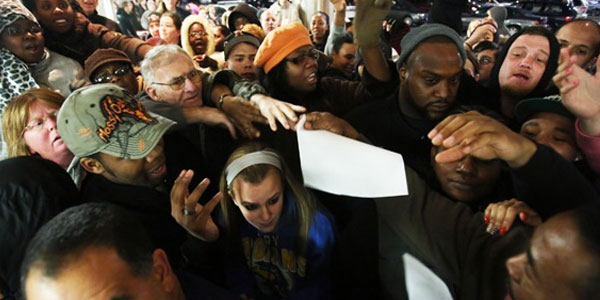Thanksgiving Weekend A Safe Bet For Retailers Both On & Offline
Posted: November 24, 2014
Updated: November 24, 2014

The Friday after Thanksgiving has been a traditional shopping day of great significance since Roosevelt decided it should be, and seventy years on, it’s bigger than ever
The commercial aspects of Thanksgiving might loiter unseen much of the time behind a barrage of cutesy pilgrims and and television commercials showing photoshop-perfect people giving thanks, but in the end it is the economy that is the engine behind much of the celebrations. Americans basically come together as a nation, give thanks for their blessings, and then go buy stuff in what has become busiest shopping weekend of the year.
So much so that in 2013 retailers began opening their store’s doors on Thanksgiving Day itself preempting the rush on what has become known as Black Friday (the Friday the day after Thanksgiving). This would make President Roosevelt very happy since it was he who presided over the legislation that brought Thanksgiving up to the level of a national holiday back in the early 1940s when states tended to celebrate it as and when they wished.
With the economy needing a boost, the president that would soon be swept up in World War II, decided that the fourth Thursday in November would adequately extend the shopping period before Christmas and thus give a retail spending boost to the flagging economy. This was both hugely successful and very popular, with a great many people taking advantage of the Friday to begin their shopping for Xmas gifts, just as had been planned.
More recently the weekend has even developed a Monday component with a massive number of people taking to the internet betting in the US there’s at least a few gift ideas they’ve not seen yet. This “Cyber Monday” now accounts for nearly as much trade as bricks-and-mortar retailers and stores during Black Friday, the modern internet super information highway a shopping gateway that some take advantage of just as soon as dinner is done and digesting.
Christmas Shopping Boosts Economy
In 2013 there were 141 million people who shopped on Thanksgiving weekend, with the average consumer spending just over $400, which was 2 million more people than the year before, despite that average spend being down 3.9% from the year before perhaps reflecting the economic realities rather than people’s desire to find a bargain. Gambling news from the internet was that of lower prices Cyber Monday saw a far more striking result.
Black Friday & Cyber Monday
- 141 million people go shopping Thanksgiving weekend
- Many purchase on mobile betting easier than going to stores
- Cyber Monday sees online retailers rival their real-world counterparts
Total online sales on Cyber Monday 2013 alone were a staggering $2.29 billion which is a massive 16% rise on the same period 12 months before, with nearly 40% of those sales coming as a result of people shopping via their phones or tablets. This brings the total spend online over the course of the weekend to reach a hugely encouraging $7.4 billion accounting for more than 10% of retailers total holiday sales.
That rise of 26% year on year has left some to tip online shopping likely to overtake bricks-and-mortar purchasing during Thanksgiving within a few years. Cyber Monday already has the web getting $961 million in sales compared to just $801 millions worth of sales in the physical stores, and perhaps it won’t be many more years before the entire weekend is dominated by the online retailers rather than the big box stores.
Even Black Friday saw a record online spend of nearly $2 billion which is up nearly 30% year on year in 2013, which might explain the 91% increase in PayPal mobile with eBay seeing a 127% increase in the number of orders placed over the same time in 2012. This competition from the computer cyberverse has forced bricks-and-mortar stores to open earlier and offer bigger deals. Some of the biggest traders even opening up on Thanksgiving itself.
Bargain Hunters & A Body Count
Walmart, for instance, opened its doors on Thanksgiving 2013 and between 6pm and 10pm that day had seen 10 million transactions from over 22 million shoppers who had stepped through their store doors on the night perhaps attempting to avoid the carnage of Friday. And “carnage” is no exaggeration, in the last seven years Black Friday has caused the deaths of four Americans, and seriously injured another 76. People died just shopping.
These instances alone may well be helping push the rise of online sales, although social media referrals have also had a major impact. Twitter referrals were up 24% on the previous year, within Pinterest seeing 17% growth and Facebook just behind them on 12% growth. This produced, in the five days of Thanksgiving in 2013, a revenue of $150 million just from referrals. Which might seem a lot but lets put that in perspective.
The same level of revenue, $150 million, was achieved by online retailers as a whole between 8pm and 9pm on Cyber Monday in 2013, in just a single hour doing as much business as all the referrals had managed in 5 days, but whilst fewer of us are using referrals we are all still out there getting online gambling sites in the US will provide us with that all important present for Aunty Mabel that we definitely fight our way through the stores to gain.
Overall sales may have fallen slightly, by 2.9%, on the previous year but perhaps in light of the economic situation that isn’t as bad as it might have been, and the chances are this year that trend will be reversed with retailers both on and offline expecting a massive quantity of spending over the Thanksgiving weekend, just like President Roosevelt wanted, and the modern day economy so desperately needs.
















